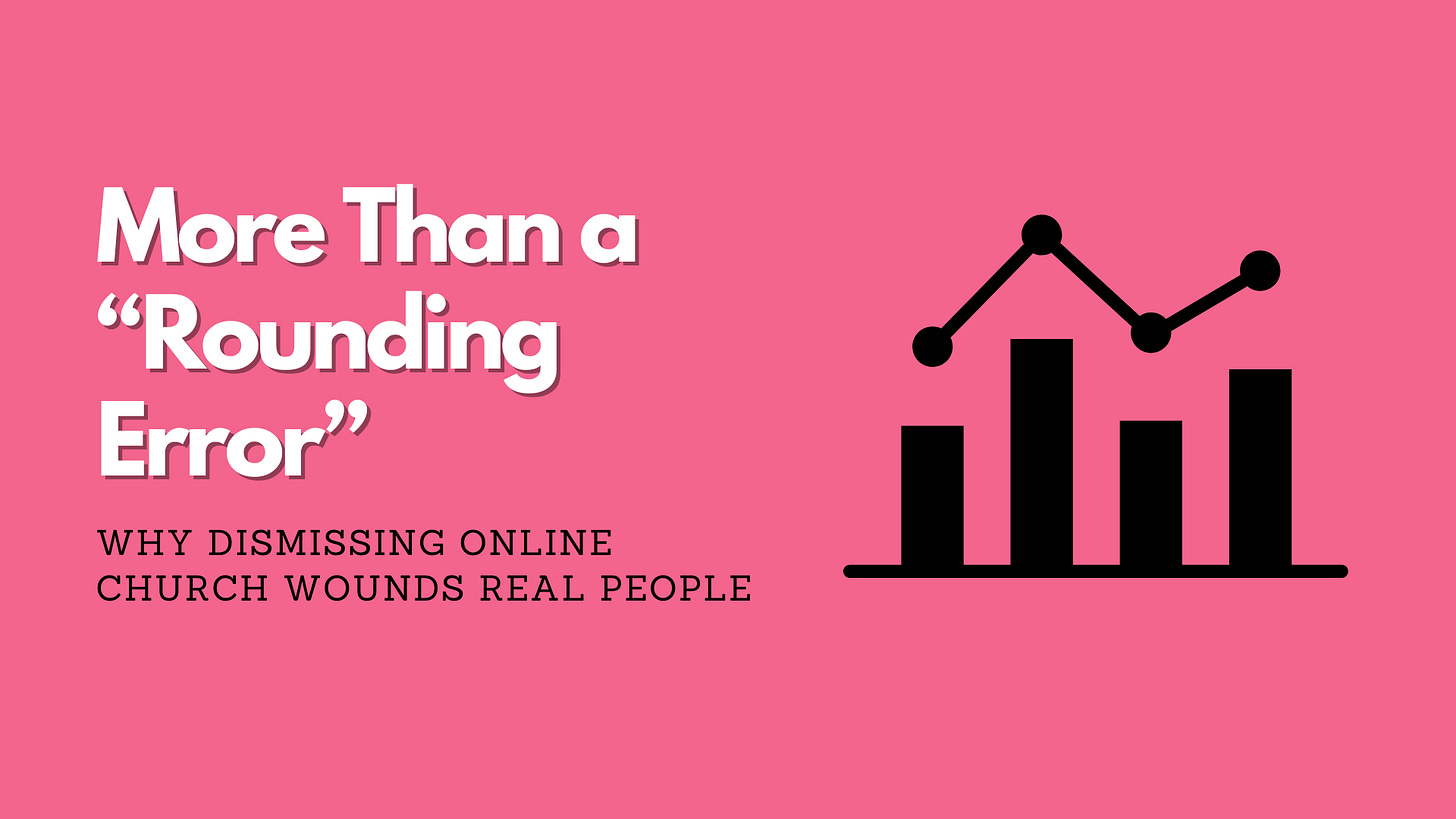More Than a “Rounding Error”
Why dismissing online church wounds real people
Data can be important, but if you put it over human beings in a ministerial setting, you’re missing the point.
A recent Holy Post interview with statistician–pastor Ryan Burge illustrated that danger in real time. When host Skye Jethani mentioned Gen Z gravitating toward digital expressions of faith, Burge scoffed:
“So what—online church? Oh, please God, no.”
He then reduced the roughly 15 percent1 of U.S. Christians who prefer worshipping online to an “infinitesimally small rounding error.”
The two then proceed to wax poetic on the loneliness epidemic. The gall.
At first, this got me heated.
Now, I’ve calmed down and thought this through, and well, we need to talk about this.
Numbers Don’t Cry—People Do
We should start with the numbers.
For a statistician, numbers are vital. But for the pastor, numbers are only as significant as the stories that they tell.
When someone who analyzes numbers sees a small number and scoffs… the numbers are unbothered. Those numbers don’t have any feelings… The people that I serve have feelings. They need to know that they matter.
This is how you fight back against an epidemic of loneliness.
Every percentage point is a caregiver streaming worship during chemo, a military spouse who moves every 18 months, a neurodivergent teen who finds community on Discord at 2 a.m. Or they’re just someone who prefers online community—no qualifier needed.
They aren’t statistical noise; they’re neighbors.
Whenever Christian leaders say that you—digital native who has found a home in an online church—you’re a rounding error, that is problematic and directly doing harm.
It’s only exacerbating the loneliness.
Public dismissal from respected voices doesn’t just bruise egos; it ignites shame and self-doubt in believers already fighting to justify their digital belonging.
I won’t pull my punches here. The Holy Post and Ryan Burge are loud voices in the Christian space. Through the careless rhetoric and lack of counterargument, I believe that my 800+ member fully digital congregation has been dehumanized.
They owe my congregation an apology.
Data Isn’t the Villain—Dehumanization Is
Good research can illuminate ministry gaps; bad interpretation can widen them.
Actually, I want to amend that… I don’t think that Ryan Burge’s interpretation of the data is bad. That is likely an honest perception of a small number. What is harming is not the interpretation itself, but the framing.
As those in ministry, we serve a more specific purpose than just interpreting data. We then provide insight into that data in a responsible and ethical manner, ensuring it does not dehumanize those being positively impacted, particularly in minority communities (in this case, digital natives).
If Jesus’ parabolic shepherd leaves the ninety-nine sheep to find one, what might He do with my hundreds—or the millions covered by that percentage? The lesson isn’t to ignore metrics but to let compassion, not convenience, shape their meaning.
If God counts the hairs on our heads, the Church can surely stop rounding down His people. Wherever two or three gather—even if the Wi-Fi stutters—Christ is there, pixels and all.
May every digital disciple hear this clearly: you are not a rounding error. You are the reason the Shepherd still leaves the ninety-nine.
World 3-20 Complete
Q: When is a sample size truly ‘significant’?
A: The moment it contains someone you love.
This is according to a Pew Survey done a year into the COVID-19 pandemic. Also, it’s closer to 11%. This leaves my argument unaffected.




I appreciate what you are saying here and it has often been my argument with those who do not see the value of sharing church or “doing” church on-line. Yes, it would be great if everyone came to physically to church, but for many reasons that is not always a possibility-whether due to frailty, obligations on Sunday, work, travel, or just life, I believe that having access to worship and other Christian community on-line can make a difference. I do not have a large following, but I’m ok with that. What I remind people is that I am called to be faithful and if by having the worship available online makes a difference to just one person than it is doing its job-connecting people to God and something greater than themselves. Thanks for posting this.
The people that I serve have feelings. They need to know that they matter.